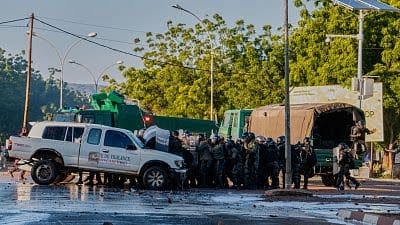Cameroon’s tense political atmosphere intensified this week after an arson attack on the ruling party’s office in Dschang, western Cameroon, as the nation awaits the final results of the October 12 presidential election. The Cameroon People’s Democratic Movement (RDPC) office was set ablaze late Wednesday, with images of the burning building spreading widely on social media.
Secretary General Jean Nkuete condemned the incident and vowed to pursue legal action against those responsible. The attack came amid mounting disputes over the vote, with opposition candidate Issa Tchiroma Bakary declaring himself the winner and accusing the government of large-scale electoral fraud. Tchiroma, once a minister under President Paul Biya, alleged “systematic vote manipulation” and called on the 92-year-old leader to concede defeat after 42 years in power.
The Electoral Council (Elecam) has since established a National Commission for the Final Vote Count, chaired by Essombe Emile, to review and validate all regional tallies before forwarding them to the Constitutional Council. The Council is expected to announce the official results by October 26. The commission includes judicial magistrates, government officials, Elecam representatives, and delegates from all 12 presidential candidates.
Meanwhile, sporadic protests have erupted in major cities such as Douala and Yaoundé, with demonstrators demanding transparency in the vote count. Security forces responded with tear gas and water cannons to disperse crowds, and dozens were reportedly detained near Elecam’s headquarters.
The election took place against a backdrop of high inflation, youth unemployment, corruption, and ongoing security challenges in Cameroon’s Anglophone regions. More than eight million registered voters cast their ballots for ten candidates, including long-time incumbent Biya and his northern rivals Issa Tchiroma Bakary and Bello Bouba Maigari.
Despite Biya’s age and declining public support, analysts still expect him to secure another term — though opposition groups claim the poll marks a turning point in Cameroonian politics. “The people want change,” said one voter in Douala. “We’ve suffered for decades; this election must bring a new beginning.”
As tensions remain high, both domestic and international observers — including a Southern African Development Community (SADC) mission — are monitoring developments closely, urging calm and respect for constitutional procedures.
With the final results expected within days, Cameroon stands at a crossroads, balancing between its long history of political continuity and a growing demand for democratic change.



